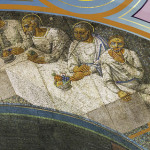We run our website the way we wished the whole internet worked: we provide high quality original content with no ads. We are funded solely by your direct support. Please consider supporting this project.
How do you respond to Isaiah 53:9?
Speaking of the suffering servant Isaiah says, “[T]hey made his grave with the wicked and his tomb with the rich…”
As with most evangelical exegetes, I believe that Isaiah 53 constitutes a beautiful and stunning prophetic look at the person of Jesus Christ. The most impressive feature of this prophecy is that the suffering servant would die with the wicked but be buried with the rich. It was common practice for Jews to leave the corpses of executed criminals unburied as part of their punishment. Jesus, of course, perfectly fulfills this prediction as he was crucified with thieves but was buried in a tomb supplied by Joseph of Arimathea, a wealthy member of the Sanhedrin (Matt. 27:57–61).
This prophecy clearly reveals one segment of the future that was decided upon by the time Isaiah was writing. The future, I argue, is partly open and partly closed: here we encounter a segment that was definitely closed. At this point it was certain that the coming savior would have certain characteristics (vs. 2–3, 7, 9), would be persecuted and would die for the sins of others (vs. 3–10), would die with the wicked but be buried with the rich (vs. 9), and would finally be vindicated and reign victorious (vs. 10–12). As with many predictive prophecies about Christ in the Old Testament, God could only ensure that such things would certainly come to pass if he had the power to determine (and thus foreknow) whatever he wanted to determine about the future. He is the Lord of history.
But neither this passage nor any predictive prophecy in the Old Testament requires that everything about the future is settled and known by God as such. The fact that the future is partly settled does not mean that it is exhaustively settled.
For God to be able to predict this much about the life, death and resurrection of his future Incarnate Son, he would have to know the general characteristics of his Son and the general features of how a mass of people in certain conditions would respond to him when he came. For a triune God who knows himself (and therefore the Son) perfectly and who knows fallen human nature perfectly, we can’t imagine this being too difficult.
He would also have to plan on wisely orchestrating matters as much as was necessary to ensure that Jesus’ death would occur in a certain prescribed fashion, e.g. he would die with criminals and be buried in a rich man’s tomb. But again, we can’t imagine this being difficult for a perfectly wise and sovereign God to accomplish. And there’s no reason to suppose that God would have to temporarily turn people into robots to accomplish it.
To return again to the chess analogy, simply by virtue of his infinite intelligence the supreme cosmic chessmaster may foresee that, regardless of what his opponent may choose to do, within seventeen moves he will checkmate his opponent by offering up his queen for a pawn. To my understanding, this was precisely what God in his wisdom did to Satan when he became a man and allowed himself to get crucified. It is why Paul declares that if any of the “rulers of this age understood” God’s manifold wisdom “they would not have crucified the Lord of glory” (1 Cor. 2:8, cf. Eph 3:8–10). Satan along with his spiritual and human minions were simply outsmarted. They played into God’s hand. They went for the queen and got checkmated.
A God who perfectly anticipates all possibilities and who knows his opponents perfectly (after all, he created them) is able to control the overall flow of the game and even declare particular outcomes along the way in this fashion. And he does it simply by being supremely intelligent. All the foreordained details surrounding the life and ministry of Christ that are not the result of God’s direct hand are the result of God’s infinite wisdom anticipating every possible move free agents might make.
Still, someone might object, it doesn’t seem that the Lord could have been certain that (say) Joseph of Arimathea would offer up his tomb for Jesus’ burial hundreds of years before Jesus or Joseph was even born, unless he had exhaustive foreknowledge or absolute control of the future at the time he gave this prophecy. What if the parents of Joseph of Arimathea had chosen not to have him? Or what if Joseph of Arimathea had chosen a path in life for himself that resulted in him being poor instead of rich? Or what if Joseph had simply refused to offer up his tomb?
This is in effect like wondering how the supreme chessmaster could have announced seventeen moves ago that within seventeen moves he was going to checkmate his opponent. It might look to those of us who are of average intelligence that things had to go the way they did for matters to turn out as they did. And so we are inclined to believe that the chessmaster must have somehow foreknown how the game was going to go. But in fact it may be the case that we could have arrived at this same point via many different routes, and a supremely intelligent chessmaster would have seen this.
So too, because the rich man who was to offer his tomb turned out to be Joseph of Arimathea doesn’t mean that from the moment of its declaration in Isaiah the rich man had to be Joseph of Arimathea. If it was possible for Joseph to refuse (despite the strong prompting of the Holy Spirit), we can be assured that God would have found (and had been preparing) other candidates for this task. Had history in fact moved in this direction, some might now be wondering how God was certain ahead of time that (say) “Jacob of Sardi” would offer up his wealthy tomb for Jesus’ burial.
Category: Q&A
Tags: Open Theism, Q&A
Topics: Open Theism, Responding to Objections
Verse: Isaiah 53
Related Reading

How do you respond to Exodus 4:11?
“The Lord says to Moses, “Who gives speech to mortals? Who makes them mute or deaf, seeing or blind? Is it not I, the Lord?” According to some compatibilists, this passage teaches that all infirmities are willed by God. This interpretation is not required, however. Three things may be said. First, as a matter of…

Podcast: Where Does Omniscience Fit In Within Open Theism?
Greg pontificates on what God knows. http://traffic.libsyn.com/askgregboyd/Episode_0280.mp3

Open2013
As I’m sure many of you know, the understanding of the Christian faith and the model of the Christian church is in the process of being transformed. All around the globe, and in a multitude of different ways, we are seeing new wine being poured out and old wine skins bursting apart. Many of us…

The Open View of Messianic Prophesies
Image by Lawrence OP via Flickr A number of passages speak of particular events being foreknown by God, even events resulting from individuals’ free will. For example, dozens of prophesies in the OT accurately predict details about the coming Messiah (e.g., he would be born in Bethlehem; arise out of the lineage of Abraham; be executed with…

What is the significance of 1 Chronicles 21:15?
“And God sent an angel to Jerusalem to destroy it; but when he was about to destroy it, the Lord took note and relented concerning the calamity; he said to the destroying angel, ‘Enough! Stay your hand.’” This powerful passage tells us why God sent the angel and why he changed his mind. If God…

What is the significance of 1 Samuel 15:35?
“…the Lord was sorry that he made Saul king over Israel.” (see 1 Sam. 15:12). Once again, the Lord expresses his regret over having made Saul king of Israel, an emotion which is inconsistent with the classical view of God’s foreknowledge. It’s important to note that Samuel had prayed all night trying to change the…
